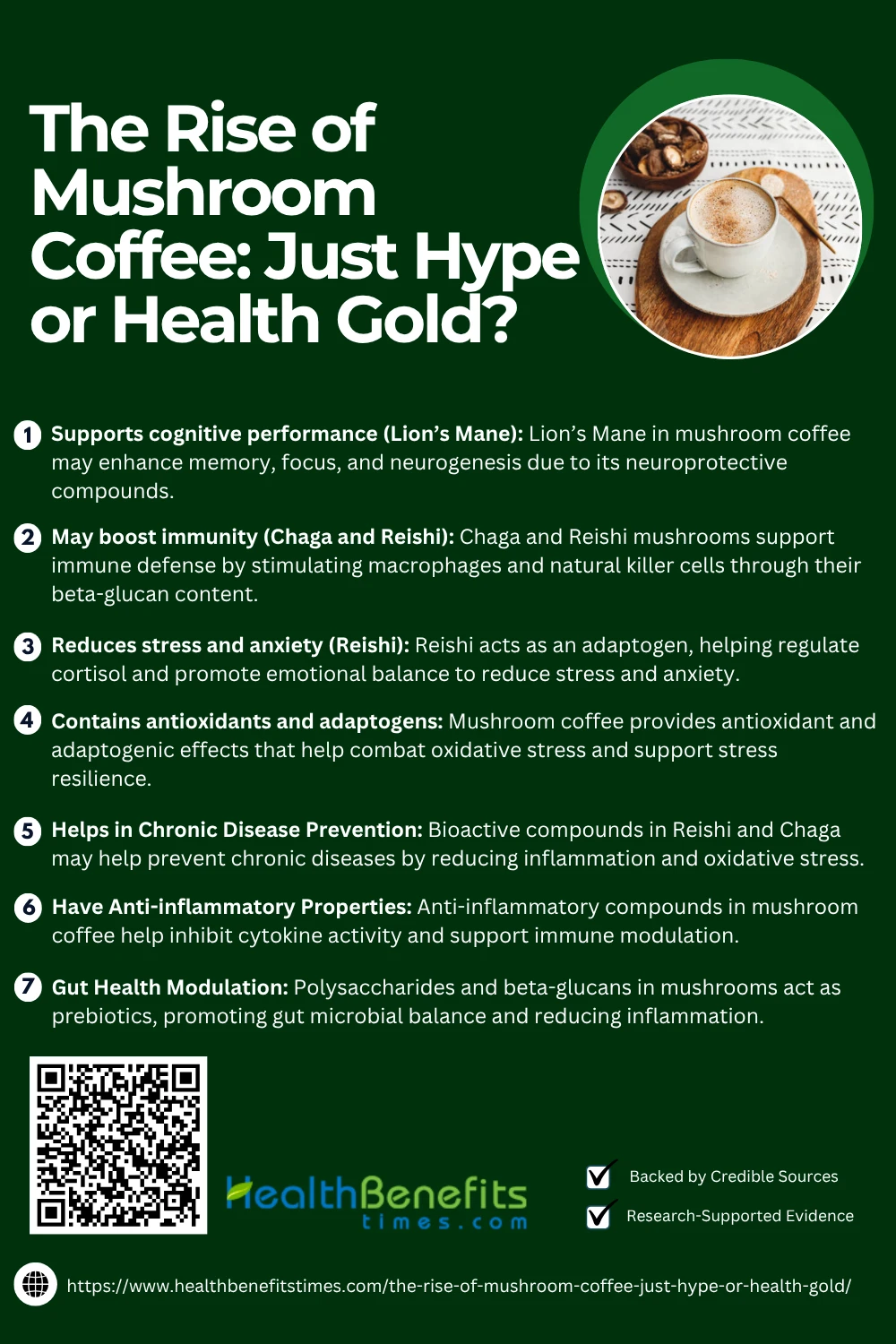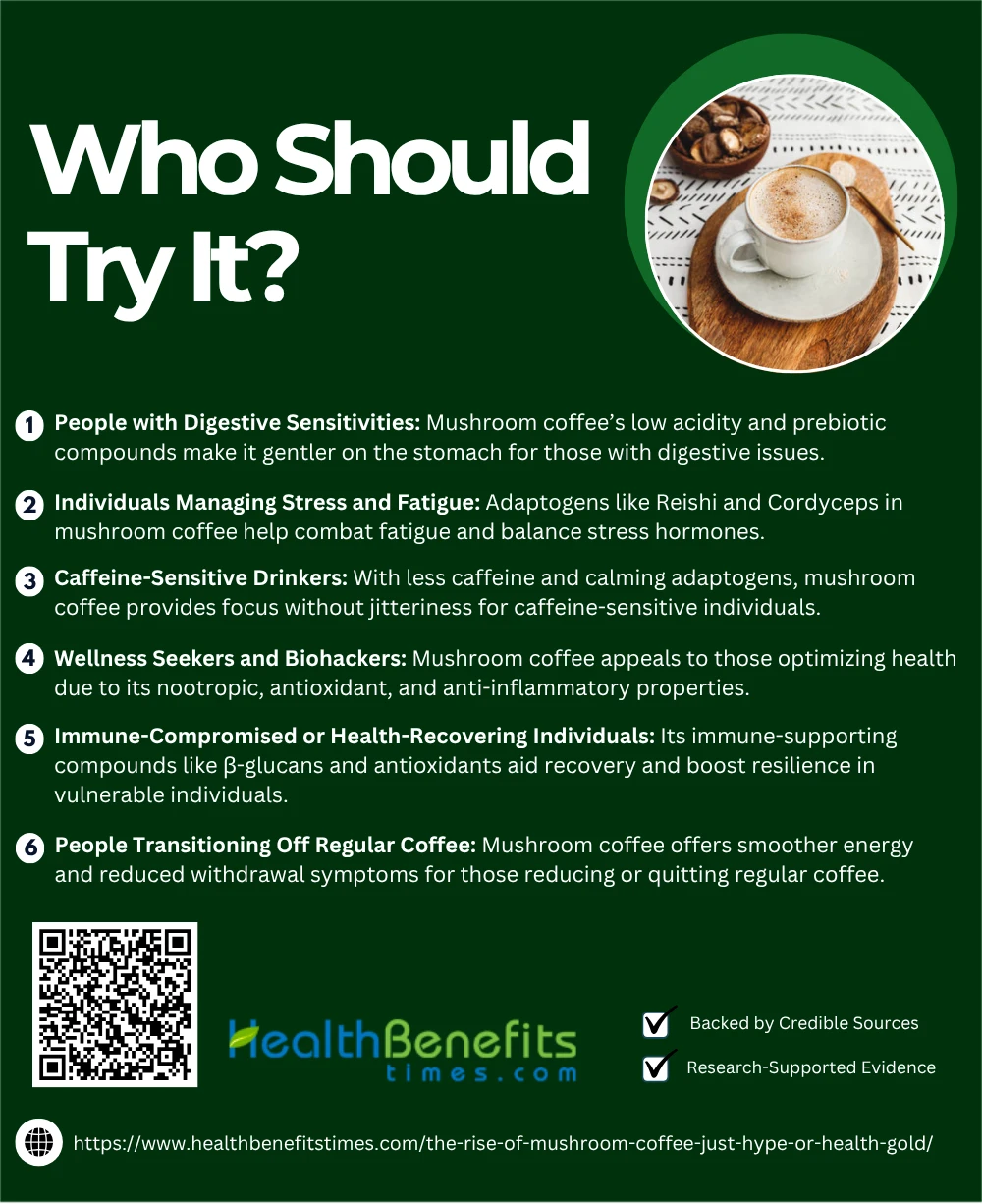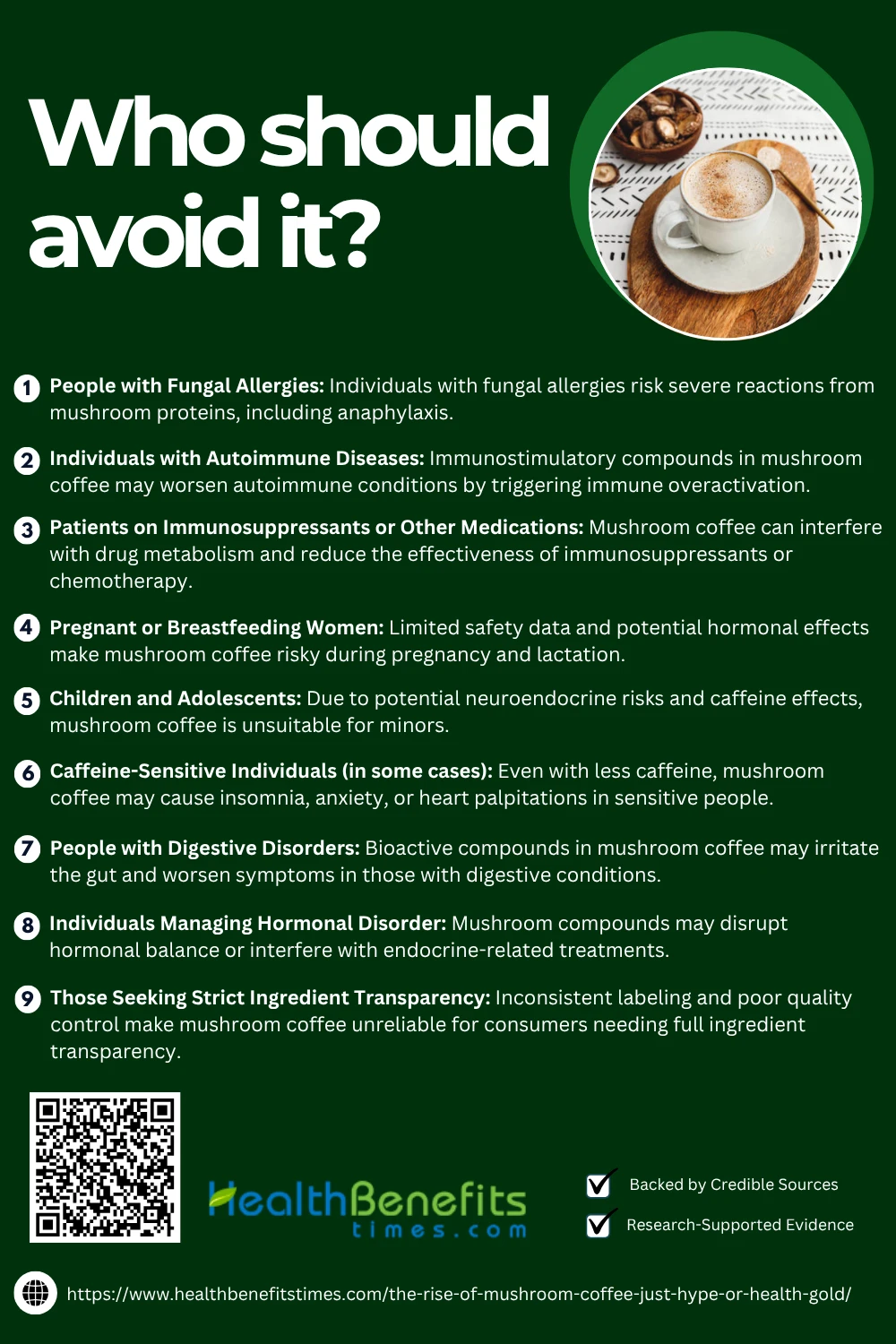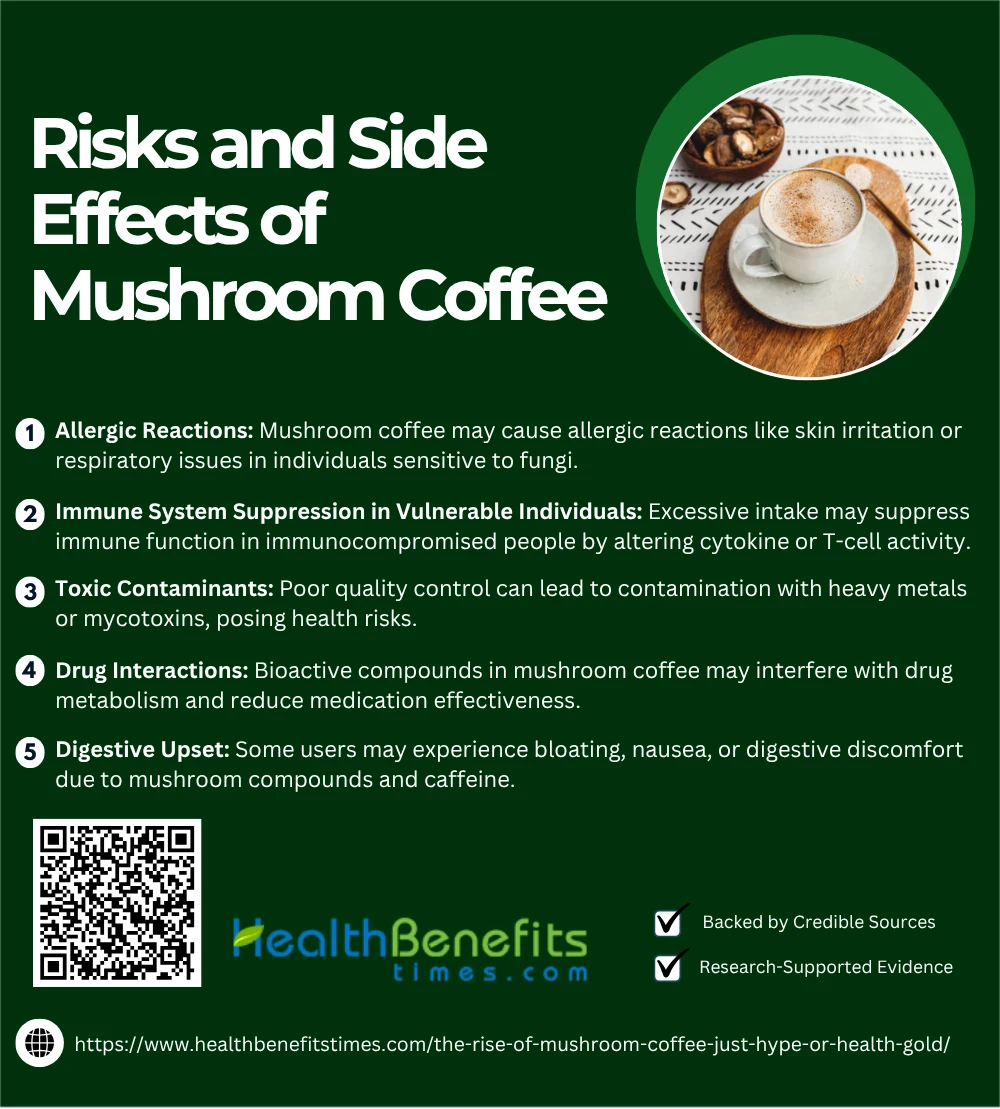- Coffee is a brewed beverage made from roasted seeds of the Coffea plant, known for its caffeine content and bold flavor.
- Mushroom coffee blends medicinal fungi like Reishi or Lion’s Mane with traditional coffee, promising added health benefits.
- As its popularity grows, experts debate whether it’s a wellness breakthrough or marketing-driven hype.
 Mushrooms are a diverse group of fungi known for their rich nutritional content and bioactive compounds that support immune modulation and neurological health. From wellness influencers to urban cafés, mushroom coffee has surged into the mainstream as the next “smart drink,” merging adaptogenic mushrooms with traditional coffee beans. Promoted for its potential to enhance cognition, reduce stress, and support immune health, this beverage is brewed with functional mushrooms like Lion’s Mane, Chaga, Reishi, and Cordyceps. Some studies suggest that these mushrooms may provide neuroprotective and anti-inflammatory benefits, potentially making mushroom coffee more than just a passing fad. Yet, skepticism remains as much of the evidence is preliminary, prompting researchers to call for more robust human trials. In the meantime, the public interest is bolstered by growing recognition of mushrooms’ bioactive role in modulating cognitive and immune functions.
Mushrooms are a diverse group of fungi known for their rich nutritional content and bioactive compounds that support immune modulation and neurological health. From wellness influencers to urban cafés, mushroom coffee has surged into the mainstream as the next “smart drink,” merging adaptogenic mushrooms with traditional coffee beans. Promoted for its potential to enhance cognition, reduce stress, and support immune health, this beverage is brewed with functional mushrooms like Lion’s Mane, Chaga, Reishi, and Cordyceps. Some studies suggest that these mushrooms may provide neuroprotective and anti-inflammatory benefits, potentially making mushroom coffee more than just a passing fad. Yet, skepticism remains as much of the evidence is preliminary, prompting researchers to call for more robust human trials. In the meantime, the public interest is bolstered by growing recognition of mushrooms’ bioactive role in modulating cognitive and immune functions.
What Is Mushroom Coffee?
Mushroom coffee is a blended beverage made by combining traditional coffee with powdered medicinal mushroom extracts like Lion’s Mane, Chaga, Reishi, and Cordyceps, designed to offer both caffeine stimulation and potential health benefits. Unlike simply steeping mushrooms in hot water, the process involves hot water and/or dual extraction methods to isolate bioactive compounds such as polysaccharides, triterpenoids, and beta-glucans from the fungi. (1) Chaga mushrooms are often harvested for their antioxidant-rich properties, while Lion’s Mane may support neurogenesis and cognitive function. (2) (3) Reishi contributes to immune modulation, and Cordyceps is prized for its adaptogenic effects and energy enhancement. (4) (5) Together with roasted coffee, this mix is dried and powdered to form a convenient, functional drink. (6) (7)(8)(9)
Common Medicinal Mushrooms in Coffee and Their Purported Benefits
Here’s a clear and concise table showing common medicinal mushrooms used in coffee and their purported health benefits:
| Mushroom | Scientific Name | Purported Benefits |
| Lion’s Mane | Hericium erinaceus | Enhances cognitive function, supports nerve regeneration, may reduce anxiety and depression |
| Chaga | Inonotus obliquus | Rich in antioxidants, supports immune system, may help reduce inflammation |
| Reishi | Ganoderma lucidum | Adaptogen for stress reduction, immune modulation, may support sleep and mood |
| Cordyceps | Cordyceps militaris/sinensis | Boosts energy and endurance, supports respiratory function, potential anti-aging effects |
| Turkey Tail | Trametes versicolor | Immune-boosting polysaccharides (PSK, PSP), supports gut health |
| Maitake | Grifola frondosa | May help regulate blood sugar, boost immune function |
| Shiitake | Lentinula edodes | Cardiovascular support, immune enhancement, antimicrobial properties |
Why Is Mushroom Coffee Trending?
Mushroom coffee is riding a wave of interest in functional wellness beverages, thanks to rising consumer awareness about natural cognitive enhancers and immune boosters. The beverage combines traditional coffee with medicinal mushrooms, many of which are considered adaptogens that help the body resist stress and fatigue. (10) With COVID-19 intensifying focus on immune health, ingredients like Reishi and Chaga have gained traction for their immune-modulating properties. (11) Lion’s Mane is also praised for its neuroprotective effects. This trend aligns with the explosion in functional beverage markets, which reflect consumer demand for both convenience and health benefits. (12) Wellness enthusiasts are drawn to mushroom coffee as a lower-jitter alternative to standard caffeine, with added benefits for gut health, cognition, and stress resilience. (13) (14) (15) (4) (16)
The Verdict: Hype or Health Gold?
Mushroom coffee exists at the crossroads of science and trend, offering potential benefits but not without limitations. While compounds in Lion’s Mane and Cordyceps show promise for neuroprotection and immune support, robust, placebo-controlled human trials remain scarce. (17) (14) For some, particularly those sensitive to caffeine or interested in natural cognitive enhancement, it may be a meaningful alternative. (18) However, exaggerated marketing often overstates effects based on preclinical or anecdotal evidence. (19) While adaptogenic effects are biologically plausible, science cautions against overgeneralization. (20) As interest grows, consumers should look for products with standardized extracts and transparency. (21) Future research must address clinical efficacy, bioavailability, and long-term safety to determine whether this trend is a functional fad or a lasting wellness tool. (22) (23)
Potential Health Benefits of Mushroom Coffee
Mushroom coffee is gaining attention not just for its unique flavor but also for its potential health perks, from boosting brain function to supporting immunity and reducing caffeine-related side effects.
 1. Supports cognitive performance (Lion’s Mane)
1. Supports cognitive performance (Lion’s Mane)
Mushroom coffee may enhance cognitive function, largely due to Lion’s Mane mushroom, which contains hericenones and erinacines that support neurogenesis and memory. Studies highlight its potential for improving attention, learning, and mood. (24) (8) Its role as a natural nootropic is gaining attention among clinicians and supplement researchers for its neuroprotective properties. (25) (26) (12)
2. May boost immunity (Chaga and Reishi)
Reishi and Chaga mushrooms, key ingredients in mushroom coffee, are rich in beta-glucans and polysaccharides that help regulate and stimulate immune responses. These bioactives enhance the activity of macrophages and natural killer cells, which play crucial roles in defending against infections. (27) (28) (29) (4) (30)
3. Reduces stress and anxiety (Reishi)
Mushroom coffee, especially formulations with Reishi (Ganoderma lucidum), may help regulate the body’s stress response by acting as an adaptogen—balancing cortisol levels and supporting adrenal function. (31) Studies show its potential in managing anxiety and emotional fatigue. (19) (32) Reishi’s calming effect may arise from modulation of hormonal mediators like catecholamines. (33) (34)
4. Contains antioxidants and adaptogens
Mushroom coffee delivers both antioxidants and adaptogenic benefits through medicinal fungi like Chaga and Reishi, rich in phenolics and beta-glucans. (4) These compounds help combat oxidative stress and support systemic balance. Adaptogens assist the body in adapting to fatigue and stressors. (30) Chaga, in particular, offers potent free radical-scavenging activity, while Reishi supports endocrine balance. (27) (29)
5. Helps in Chronic Disease Prevention
Functional mushrooms in mushroom coffee, such as Reishi and Chaga, contain bioactive polysaccharides and triterpenoids that may aid in preventing chronic conditions like cardiovascular disease, diabetes, and certain cancers. These compounds demonstrate antioxidant, anti-inflammatory, and immunomodulatory activities . (27) Research supports their role in reducing oxidative stress and metabolic imbalanc. (35) (36) (35) (37)
6. Have Anti-inflammatory Properties
Mushroom coffee, particularly blends with Reishi and Chaga, delivers compounds like beta-glucans and triterpenoids known for anti-inflammatory action. These substances inhibit inflammatory mediators and modulate immune responses, offering protection against chronic inflammation. (30) Reishi’s triterpenoids suppress NF-κB pathways, reducing cytokine activity. (38) Chaga also exhibits antioxidant-linked anti-inflammatory effects. (4) These bioactives enhance systemic resilience and may support inflammatory-related conditions. (30) (38)
7. Gut Health Modulation
Mushroom coffee contributes to gut health through its rich content of polysaccharides and beta-glucans, which function as prebiotics. These compounds foster beneficial bacteria and help balance gut microbiota. (30) Studies indicate mushroom-derived beta-glucans enhance microbial diversity and reduce gut inflammation. (39) Mushrooms like Chaga and Reishi are linked with gut-supportive bioactives. (40) (41) (42)
Risks and Side Effects of Mushroom Coffee
While mushroom coffee offers health benefits, it’s not without risks. Some individuals may experience allergic reactions, digestive discomfort, or potential interactions with medications, making caution essential before regular consumption.
Mushroom coffee can trigger allergic responses in susceptible individuals due to fungal proteins and spores, especially among those with mold sensitivity. These reactions can range from skin irritation to respiratory hypersensitivity. (43) Studies also highlight potential risks from airborne fungi and food-borne contaminants. (44) (45)
2. Immune System Suppression in Vulnerable Individuals
Though many mushrooms act as immunomodulators, excessive or unregulated intake may cause immune suppression, especially in immunocompromised people. Reishi and Chaga, while beneficial for many, may interfere with cytokine signaling or drug therapies. (46) Fungal compounds can alter T-cell responses and immunoglobulin profiles in sensitive populations. (47) (48)
3. Toxic Contaminants
Mushroom coffee may contain harmful contaminants like heavy metals or mycotoxins due to unregulated harvesting or inadequate quality control. A study on selenium-enriched mushrooms raised concerns over bioaccumulation risks from substrates like coffee husks. (49) Another case documented liver injury linked to Ganoderma coffee extract. (50) Additionally, Cordyceps coffee showed variable safety profiles. (51)
4. Drug Interactions
Mushroom coffee can interact with prescription drugs by affecting liver enzymes or altering absorption. One case reported cholestatic liver injury from Ganoderma coffee extract. (52) A review cautions that bioactive compounds in Cordyceps and Hericium may modulate drug metabolism. (53) Moreover, Ganoderma lucidum was shown to interfere with anticancer drugs. (54)
5. Digestive Upset
Mushroom coffee may trigger digestive upset in sensitive individuals due to bioactive compounds that affect gastrointestinal activity. Some studies note that Cordyceps and Hericium extracts can overstimulate the digestive system, especially when combined with caffeine. (53) Occasional mild symptoms like bloating or nausea have been reported with reishi intake. (55) Gastric stimulation and peristalsis can also lead to discomfort. (56)
Mushroom Coffee vs. Regular Coffee
Here’s a comparison table showing the key differences between Mushroom Coffee and Regular Coffee across important attributes:
| Aspect | Mushroom Coffee | Regular Coffee |
| Main Ingredients | Coffee mixed with medicinal mushroom extracts (e.g., Reishi, Lion’s Mane, Cordyceps) | Pure roasted coffee beans |
| Caffeine Content | Typically lower (about 30–50 mg per serving) | Higher (80–100 mg per serving) |
| Taste Profile | Earthy, mild, sometimes bitter depending on mushroom type | Rich, strong, bitter (varies by roast) |
| Health Benefits | May boost immunity, reduce stress, enhance focus with adaptogens | May improve alertness, mood, and metabolic rate |
| Acidity | Usually lower, easier on the stomach | Often high, may cause acid reflux or digestive discomfort |
| Digestive Tolerance | Better for sensitive stomachs (contains prebiotic compounds) | May lead to digestive upset, jitters, or acid reflux in some individuals |
| Potential Side Effects | Drug interactions, allergies to fungi, mild GI upset in rare cases | Jitters, insomnia, heart palpitations, increased blood pressure |
| Antioxidants | Contains both coffee and mushroom-derived antioxidants | High in polyphenols and chlorogenic acid |
| Price | Generally more expensive | Typically affordable and widely available |
| Target Audience | Health-conscious consumers, adaptogen users | General population, caffeine users |
Who Should Try It?
Mushroom coffee isn’t for everyone, but it can be a great fit for those seeking balanced energy, improved focus, or a gentler alternative to traditional coffee with added wellness benefits.
 1. People with Digestive Sensitivities
1. People with Digestive Sensitivities
Mushroom coffee may benefit those with digestive sensitivities due to its low acidity and prebiotic compounds. Studies show it can ease gut inflammation and support microbiota balance. (57) Its polysaccharides modulate GI function positively. (53) Compared to traditional brews, it’s gentler on the stomach lining. (58)
2. Individuals Managing Stress and Fatigue
Mushroom coffee contains adaptogenic fungi like Reishi and Cordyceps, which may alleviate fatigue and regulate stress hormones. Research highlights its ability to support adrenal health and resilience under chronic stress. (59) Cordycepin also modulates energy metabolism favorably. (60) Daily intake was shown to enhance physical stamina and reduce burnout. (53)
3. Caffeine-Sensitive Drinkers
Mushroom coffee offers a gentler alternative for caffeine-sensitive individuals. Its adaptogenic blend with lower caffeine levels can reduce jitteriness while promoting focus. (61) It may support cognitive clarity without overstimulation. (62) Cordyceps in particular modulates stimulant response beneficially—a balance ideal for those avoiding full-strength coffee.
4. Wellness Seekers and Biohackers
Mushroom coffee appeals to wellness enthusiasts for its synergistic cognitive and metabolic benefits. Bioactive fungi like Lion’s Mane support neurogenesis, while Reishi enhances antioxidant resilience. (63) Biohackers value its adaptogenic performance boost without crash risks. (64) Unlike standard brews, it offers a nootropic, anti-inflammatory edge. (65)
5. Immune-Compromised or Health-Recovering Individuals
Mushroom coffee contains immune-modulating compounds like β-glucans and antioxidants that support recovery and resilience. Studies highlight Ganoderma lucidum’s role in aiding weakened immune systems. (66) Research further suggests fungal nutraceuticals enhance gut immunity. (67) These effects are beneficial for those recovering from illness. (68)
6. People Transitioning Off Regular Coffee
Mushroom coffee offers a smoother energy curve with adaptogens like Lion’s Mane and Cordyceps, making it a promising aid for caffeine withdrawal. Its low caffeine content reduces jitters while maintaining alertness. (69) Its functional benefits also include sustained focus and lower acidity, easing digestive concerns. (70) (71)
Who should avoid it?
Mushroom coffee may not suit everyone. Individuals with mushroom allergies, certain medical conditions, or those taking immune-related medications should avoid it or consult a healthcare provider before consuming.
 1. People with Fungal Allergies
1. People with Fungal Allergies
Mushroom coffee poses a significant risk to individuals with fungal allergies due to cross-reactivity between fungal proteins. Studies confirm that exposure to edible fungi can provoke severe allergic responses, including anaphylaxis. (72) Additional research links Agaricus species to immune overactivation and fungal allergens generally provoke Type I hypersensitivity. (73) (74)
2. Individuals with Autoimmune Diseases
Mushroom coffee contains potent immunostimulatory compounds like β-glucans and triterpenes that may aggravate autoimmune conditions. These bioactives can provoke immune system overactivation, disrupting balance in diseases like lupus or rheumatoid arthritis. Ganoderma lucidum has been shown to exacerbate autoimmune pathways and affect cytokine signaling unpredictably.
3. Patients on Immunosuppressants or Other Medications
Mushroom coffee may interfere with immunosuppressive drugs like cyclosporine and tacrolimus. Active compounds in fungi can modulate cytochrome P450 pathways, altering drug metabolism. (75) Reishi and Cordyceps, common in mushroom coffee, show potential interaction with chemotherapy agents. (54) These interactions may reduce treatment efficacy or increase toxicity. (76)
4. Pregnant or Breastfeeding Women
The safety of mushroom coffee during pregnancy and breastfeeding is uncertain due to limited clinical testing. Medicinal mushrooms like Reishi and Cordyceps contain bioactive compounds that may cross the placental barrier or enter breast milk. (77) Potential hormonal effects are also concerning during fetal development. (60) Caution is advised without medical supervision. (78)
5. Children and Adolescents
Mushroom coffee is not suitable for children and adolescents due to their developing neuroendocrine systems and unknown long-term impacts. Studies highlight the neuroactive risks of mushroom compounds in youth. (79) Excess caffeine and adaptogens can impair growth and cognition. (80) Furthermore, herbal-stimulant drinks are discouraged for minors. (81)
6. Caffeine-Sensitive Individuals (in some cases)
Even with reduced caffeine, mushroom coffee may trigger adverse effects in caffeine-sensitive individuals, such as insomnia, anxiety, or tachycardia. A study on adaptogen-caffeine interactions found amplified nervous system responses. (60) Caffeine hypersensitivity is also linked to increased cardiovascular strain. (82) Unpredictable stimulant synergy can exacerbate discomfort. (61)
7. People with Digestive Disorders
Individuals with digestive disorders may experience worsened symptoms from mushroom coffee due to its bioactive polysaccharides and phenolic compounds, which can aggravate gut inflammation and microbiota imbalance. (53) Additionally, its caffeine content may stimulate gastric acid, harming those with ulcers or IBS. (83) Certain mushroom-derived compounds also interfere with liver detoxification enzymes, posing risks to vulnerable digestive systems. (84)
8. Individuals Managing Hormonal Disorders
Mushroom coffee may disrupt hormone-sensitive pathways, particularly in individuals with thyroid or estrogen-related conditions. Certain mushrooms like Cordyceps influence adrenal hormone levels and cortisol response. (85) Moreover, adaptogenic mushrooms could interfere with endocrine therapy or mimic estrogenic activity. (86) Finally, their unpredictable hormonal effects raise caution for those with hormone-sensitive cancers. (87)
9. Those Seeking Strict Ingredient Transparency
Mushroom coffee products often lack consistent labeling and sourcing clarity, posing risks for consumers demanding full ingredient transparency. Studies show frequent mislabeling in commercial mushroom products, especially regarding species identification and origin. (88) Regulatory oversight on herbal formulations remains minimal, compromising safety. Additionally, quality control for imported blends is often inconsistent. (89)
Conclusion
Mushroom coffee has certainly made waves in the wellness world, offering a unique blend of earthy flavor and potential health benefits. With medicinal mushrooms like Lion’s Mane and Chaga, it promises enhanced focus, immune support, and fewer caffeine crashes. However, while some benefits are supported by early research, more robust scientific evidence is needed. It’s not a miracle drink, but for many, it serves as a healthier alternative to traditional coffee. As with any supplement, individual responses vary, and potential side effects should be considered. Ultimately, mushroom coffee may be more than just hype—but it’s not a one-size-fits-all solution.


